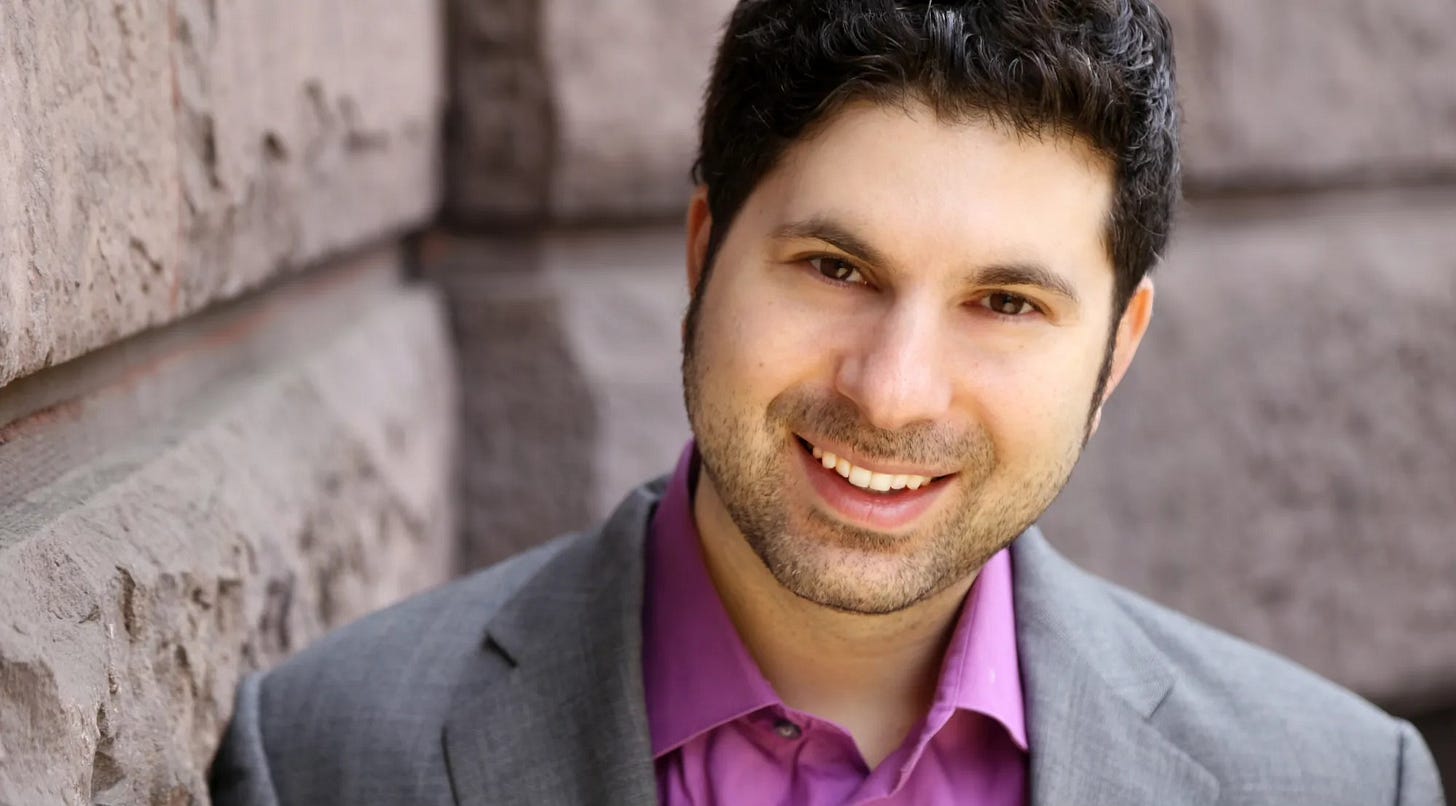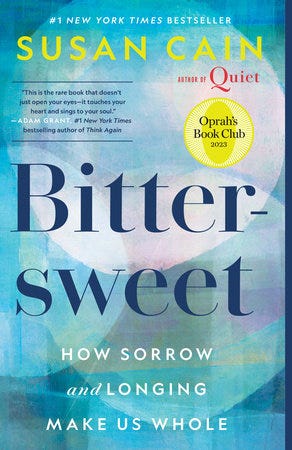Are You a "Transcender"?
The place where happiness and "cosmic sadness" meet.

My dear friend Susan Cain just published an article on her “The Quiet Life” newsletter about the characteristics of “transcenders”. These characteristics were put forth by the great humanistic psychologist Abraham Maslow many years ago, and I described them in my book Transcend. Susan has graciously given me permission to republish her article here.
I suspect many of my readers are transcenders and will deeply resonate with these characteristics. Drop me a note below if this article resonates with you!
***
Dear You,
Over all my years of writing to you, and reading and hearing your letters and comments back, I feel as if I’ve come to know so well the singular and mysterious collection of people that you are.
And I believe that many of you or your loved ones are “transcenders” - a term coined by the great humanist psychologist Abraham Maslow to describe people who seek and sometimes find transcendent experiences and values.
On the one hand, this is a lovely way of being, for the reasons you’ll read below. But, before we get too excited about belonging to such an exalted-sounding category, I should note that it doesn’t always go along with happiness. In fact, Maslow distinguishes between being a more typically psychologically healthy type, and being a transcender - which can involve plenty of happiness, yes, but also a “cosmic sadness.”
Of course, I’ve just described the state of being human.
But, as Quiet Life member and friend Scott Barry Kaufman, another great psychologist, puts it in TRANSCEND, his book on Maslow and the science of self-actualization, transcenders “are not primarily motivated by happiness, and in fact many of them are continually frustrated as they struggle to realize their higher vision for humanity (visions that are often gleaned from peak experiences).”
Transcenders, writes SBK, are often “less ‘happy’ than the [conventionally] happy ones. They can be more ecstatic, more rapturous, and experience greater heights of ‘happiness,’ but they are as prone - or maybe more prone - to a kind of cosmic sadness…over the stupidity of people, their self-defeat, their blindness, their cruelty to one another, their shortsightedness. Perhaps this comes from the contrast between what actually is and the ideal world that the transcenders can see so easily and so vividly…”

That said, here are the characteristics of “Transcenders”, as studied by Maslow and described by SBK in his book. I’d wager that you’ll recognize many of them in yourself, or in your beloveds.
One note: the characteristics on the following list are almost embarrassingly positive. But I’d suggest that they are just the flip side of everything that is difficult about being you (or your loved ones):
• “For the transcenders, peak experiences and plateau experiences become the most important things in their lives, the high spots, the validators of life, the most precious aspect of life.
• The transcenders speak easily, naturally, and unconsciously the language of Being (B‑language), the language of poets, of mystics, of seers, of profoundly religious people, of those who live under the aspect of eternity.
• They perceive the sacred within the secular, i.e., the sacredness in all things at the same time that they also see them at the practical, everyday level. They can sacrilize everything at will, i.e., perceive it under the aspect of eternity. This ability is in addition to— or mutually exclusive from— good reality testing.
• They are much more consciously and deliberately motivated by …values such as perfection, truth, beauty, goodness, unity…
• They seem somehow to recognize one another and to come to an almost instant intimacy and mutual understanding even upon first meeting.
• They are more responsive to beauty, or rather they tend to beautify all things — including things that may seem ugly to most people.
• Not only are such people lovable, as are all of the most self-actualizing people, they are also more awe-inspiring, more ‘unearthly, more easily revered.’ They have more often produced the thought ‘This is a great man.’
• Transcenders are far more apt to be innovators, discoverers of the new, of what actually could be, what exists in potential - and therefore of what might be brought to pass...
• The sacredness of every person and even of every living thing, even of nonliving things that are beautiful, etc., is so easily and directly perceived in its reality by every transcender that they can hardly forget it for a moment.
• Transcenders are more likely to be good selectors of creators (who sometimes look nutty or kooky). On the flip side, transcenders are also more able to screen out the nuts and kooks who are not creative.
• Transcenders tend to be more ‘reconciled with evil’ in the sense of understanding its occasional inevitability and necessity in the larger holistic sense. Since this implies a better understanding of it, it should generate both a greater compassion with it and a less ambivalent and a more unyielding fight against it. To understand more deeply means, at this level, to be more decisive, to have less conflict, ambivalence, regret, and thus to act more swiftly, surely, and effectively. One can compassionately strike down an evil person if this is necessary.
• Transcenders are more apt to regard themselves as carriers of talent, instruments of the transpersonal. This means a certain particular kind of objectivity or detachment toward themselves that to nontranscenders might sound like arrogance, grandiosity, or even paranoia.
• Transcenders are more apt to be profoundly “religious” or “spiritual” in either the theistic or nontheistic sense, excluding their historical, conventional, superstitious, or institutional meanings.
• Transcenders…have more end experiences, more of the fascinations that we see in children who get hypnotized by the colors in a puddle, by raindrops dripping down a windowpane, by the smoothness of skin, or by the movements of a caterpillar.
• Transcenders are somewhat more Taoistic, and the merely healthy somewhat more pragmatic. B‑cognition makes everything look more miraculous, more perfect, just as it should be. It therefore breeds less impulse to do anything to the object that is fine just as it is, less needing improvement, or intruding upon it. There should then be more impulse simply to stare at it and examine it than to do anything about it or with it.
• With increasing maturity of character, higher levels of pay (“metapay”) and reward (“metareward”) other than money and accolades increase in importance. Of course, a large proportion of self-actualizing people have probably fused work and play anyway; i.e., they love their work. Of them, one could say, they get paid for what they would do as a hobby anyway, for doing work that is intrinsically satisfying. However, transcenders additionally actively seek out jobs that make peak experiences and B‑cognition more likely.
• “Postambivalence” tends to be more characteristic of all self-actualizers and may turn out to be little more so in some transcenders. Originating in Freudian theory, this term means total wholehearted and unconflicted love, acceptance, expressiveness, rather than the more usual mixture of love and hate that passes for “love” or friendship or sexuality or authority or power, etc.”
*If you’re thinking that all of this sounds a lot like what I wrote about in my book BITTERSWEET: HOW SORROW AND LONGING MAKE US WHOLE - which explores the profound gap between the world as it is, and our occasional glimpses of the shining world we wish it to be - and in the BITTERSWEET Practices and Reflections 30-day audio course, you’re right. These ideas are cousins, maybe even siblings, to each other.


*
I hope you’ve enjoyed this taste of the great work of Scott Barry Kaufman - and of his mentor Abraham Maslow. And, as always - please share your thoughts with each other! Some prompts:
*Do you think you are, or a loved one is, a “Transcender”?
*If so, why? What do you most value about this way of being?
*Also if so, do you also know the cosmic sadness of which Maslow speaks?
*Understanding this about you and/or your loved one, what would you do differently?
*
And finally, in case you missed it, here again is our Candlelight Chat with Scott Barry Kaufman!






Well, that hit home.
So deeply hit by this... Cosmic Sadness, so much Gratitude, and a painfully immense amount of Love are sitting inside my chest. Thank You, SBK, and You, SC, for putting this into the World. And SBK, it takes one to know one:p
-deirdre